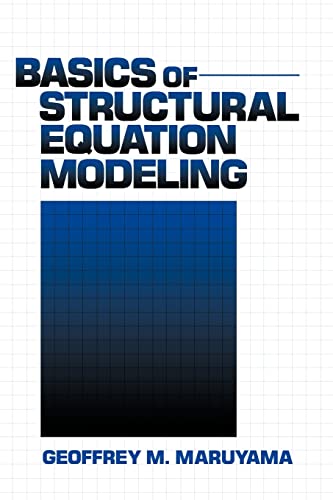Basics of Structural Equation Modeling
M. Maruyama, Geoffrey
Verkäufer
WorldofBooks, Goring-By-Sea, WS, Vereinigtes Königreich
Verkäuferbewertung 5 von 5 Sternen
![]()
AbeBooks-Verkäufer seit 16. März 2007
Beschreibung
Beschreibung:
The book has been read, but is in excellent condition. Pages are intact and not marred by notes or highlighting. The spine remains undamaged. Bestandsnummer des Verkäufers GOR007112119
Inhaltsangabe:
With the availability of software programs such as LISREL, EQS, and AMOS modeling techniques have become a popular tool for formalized presentation of the hypothesized relationships underlying correlational research and for testing the plausibility of hypothesizing for a particular data set. The popularity of these techniques, however, has often led to misunderstandings of them, particularly by students being exposed to them for the first time. Through the use of careful narrative explanation, Basics of Structural Equation Modeling describes the logic underlying structural equation modeling (SEM) approaches, describes how SEM approaches relate to techniques like regression and factor analysis, analyzes the strengths and shortcomings of SEM as compared to alternative methodologies, and explores the various methodologies for analyzing structural equation data.
Über die Autorin bzw. den Autor: My interest in what happens in diverse urban schools began when I became involved in a study of school desegregation while in graduate school. Those interests have led me to study a range of issues in schools, including school schedules and structures, teaching approaches such as cooperative learning and conflict resolution, social influence processes, and student background characteristics including poverty, type of housing, language, ability, and race/ethnicity. This work has been facilitated by time I spent in the Saint Paul Public Schools as their director of research, evaluation and assessment. Recently, my work has moved beyond schools to look more broadly at how universities engage urban communities to build partnerships addressing key social issues. I have complemented my substantive interests with methodology interests in structural equation methods and program evaluation. Finally, I have held administrative roles that have enriched and informed my research interests, including director of the Center for Applied Research and Educational Improvement (CAREI), assistant/associate vice president for multicultural and academic affairs, and now vice president for system academic administration . I am a past-president of the Society for the Psychological Study of Social Issues (SPSSI), and currently edit one of their journals, Analyses of Social Issues and Public Policy.
Bibliografische Details
Titel: Basics of Structural Equation Modeling
Verlag: SAGE Publications, Inc
Erscheinungsdatum: 1997
Einband: Paperback
Zustand: Very Good
Beste Suchergebnisse beim ZVAB
Basics of Structural Equation Modeling
Anbieter: BooksRun, Philadelphia, PA, USA
Paperback. Zustand: Good. 1. It's a preowned item in good condition and includes all the pages. It may have some general signs of wear and tear, such as markings, highlighting, slight damage to the cover, minimal wear to the binding, etc., but they will not affect the overall reading experience. Artikel-Nr. 0803974094-11-1
Gebraucht kaufen
Versand innerhalb von USA
Anzahl: 1 verfügbar
Basics of Structural Equation Modeling
Anbieter: Better World Books, Mishawaka, IN, USA
Zustand: Very Good. Used book that is in excellent condition. May show signs of wear or have minor defects. Artikel-Nr. 6031124-6
Gebraucht kaufen
Versand innerhalb von USA
Anzahl: 1 verfügbar
Basics of Structural Equation Modeling
Anbieter: Revaluation Books, Exeter, Vereinigtes Königreich
Paperback. Zustand: Brand New. 1st edition. 328 pages. 9.25x6.25x1.00 inches. In Stock. Artikel-Nr. x-0803974094
Neu kaufen
Versand von Vereinigtes Königreich nach USA
Anzahl: 2 verfügbar

